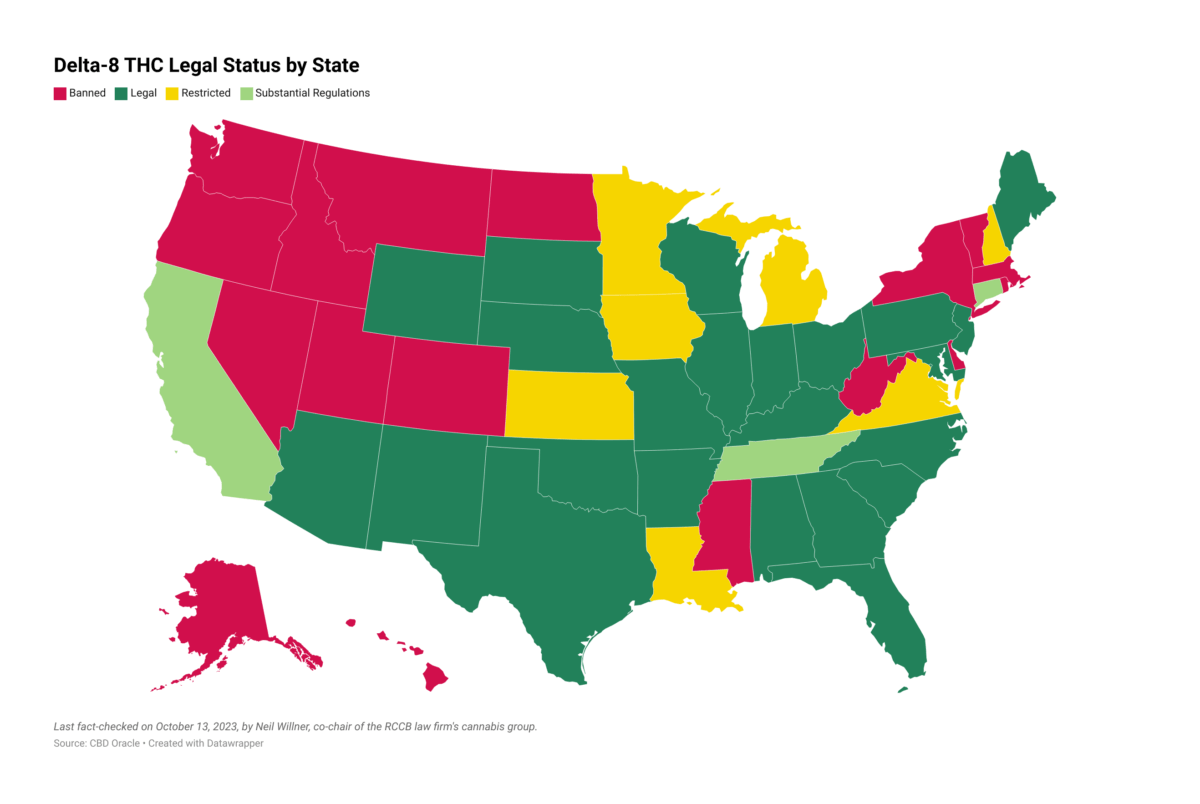Delta-8 THC is probably the most controversial cannabinoid on the planet right now. With the 2018 Farm Bill being widely considered to have removed the THC isomer from the federal list of controlled substances, hemp and CBD companies quickly found a use for their excess CBD isolate. But if you’re considering selling delta-8 THC, federal law is only a part of the picture, and at state level, you have a patchwork of different laws and regulatory schemes to contend with.
This is why CBD Oracle, working alongside Neil Willner co-chair of the Cannabis Group at Royer Cooper Cohen Braunfeld, has produced a state-by-state map of delta-8 THC’s legality based on extensive reviews of state law. If you want to know what’s going on with delta-8 THC in a specific state, this is one of the best resources around to get the answer you’re looking for.
Delta-8 THC Is Legal in 22 States and 1 District With Limited Regulation
Despite the controversy surrounding delta-8 THC, it remains legal in 22 states and 1 district, with only limited regulation. This covers the following states:
- Alabama*
- Arizona
- Arkansas
- Florida*
- Georgia (?)
- Illinois
- Indiana (?)
- Kentucky*
- Maine
- Maryland* (?)
- Missouri
- Nebraska
- New Jersey
- New Mexico
- North Carolina
- Ohio
- Oklahoma
- Pennsylvania (?)
- South Carolina (?)
- Texas (?)
- Washington D.C.
- Wisconsin
- Wyoming*
Here, a * beside the state’s name means they’ve instituted age restrictions, preventing anybody aged 21 or under from buying delta-8 THC. States marked with (?) are currently involved in legal action about the status of delta-8 THC.
In the majority of these cases, state law basically follows the blueprint laid down by the 2018 Farm Bill with few or no additional rules. In fact, only a handful of states (Alabama, Florida, Kentucky, Maryland and Wyoming) have even passed laws preventing youth from buying delta-8 THC.
Legal actions are ongoing in several states, with the situation being slightly different in each. For instance, in Maryland, the hemp industry won a temporary injunction against the state, preventing the state from enforcing the provisions of House Bill (HB) 556 which relate to hemp until the action is resolved. The bill originally made it so that delta-8 THC products (and most CBD) could only be sold in licensed marijuana dispensaries, but this was deemed by the court to create a monopoly.
Delta-8 THC Is Banned in 17 States and Severely Restricted in 7 More
For every state where delta-8 THC is de facto legal, there is another state which has either banned or severely restricted the cannabinoid. In total, CBD Oracle’s analysis shows that delta-8 THC is banned in 17 states and severely restricted in 7 more. The states with bans are:
- Alaska
- Colorado
- Delaware
- Hawaii
- Idaho
- Massachusetts
- Mississippi
- Montana
- Nevada (technically could be approved for marijuana industry)
- New York (isomerization banned, could theoretically be sold in adult use)
- North Dakota
- Oregon
- Rhode Island
- Utah (possible in medical industry)
- Vermont
- Washington
- West Virginia
And there are severe restrictions – limiting all THCs to be under 0.3% for hemp products, unless otherwise noted – in the following seven states:
- Iowa
- Kansas
- Louisiana (all THCs must be under 8 mg per serving and 1% by dry weight)
- Michigan (all THCs under 0.3% and only marijuana-derived delta-8 allowed)
- Minnesota (all THCs under 0.3% and less than 5 mg per serving)
- New Hampshire
- Virginia (2 mg serving limit or >25:1 CBD:THC ratio)
Exactly how delta-8 THC is banned or restricted varies by state. For instance, while Colorado bans the “isomerization” process used to make delta-8 from CBD, Idaho basically bans anything that contains THC at all, even if it’s just CBD with trace, federally-acceptable levels of delta-9 THC. For the restricted states, most require that all THCs total to under 0.3% by dry weight, which is technically possible for a delta-8 THC product to meet, but essentially none do.
The analysis also revealed that – just like with marijuana – making delta-8 THC illegal doesn’t automatically remove it from a community. In Hawaii and Mississippi, for instance, despite state law banning delta-8 THC, it is still openly sold.
Only Three States Have Substantial Regulations on Delta-8 THC
In California, Connecticut and Tennessee, delta-8 THC is legal but has substantial regulations in place. In California and Connecticut, delta-8 THC is treated as marijuana and is sold as part of the adult use industry. This automatically institutes a wide range of requirements on the cannabinoid, including rules on testing and labeling to ensure safety and transparency for consumers.
Tennessee is the unique case here, where delta-8 THC is regulated as a “hemp-derived cannabinoid” and is legal to sell to adults aged 21 and over. Senate Bill (SB) 378 includes requirements for testing for contaminants, informative labeling and marketing which does not target youths, as well as a 25 mg serving size limit.
The Patchwork of Laws and the Future of Delta-8 THC
The key take-away for sellers of delta-8 THC is that current state regulations are a patchwork, making it very difficult to navigate for even the most responsible of companies. The product you can sell in Arizona without issues is probably not legal in Kansas, and would require batch testing and more to be sold in Tennessee.
This uncertainty may be resolved by the upcoming 2023 Farm Bill, but even this isn’t a sure thing. While the 2018 Farm Bill opened the door to a whole host of products and simply assumed (incorrectly) that the FDA would step up to regulate finished products, the new version might offer the clarity that was lacking. However, it’s just as likely that the bill will redefine “hemp” in a way that excludes delta-8 THC by default.
Pretty much the only thing you can depend on is that you’ll need to keep a close eye on state laws in the coming year. CBD Oracle’s map will be continuously revised to reflect the current legal reality and help responsible hemp companies remain compliant.
______________________________________________________________________________________
Lee Johnson is the senior editor at CBD Oracle, and has been covering science, vaping and cannabis for over a decade. He focuses on research-driven deep dives into topics ranging from medical uses for CBD to industry and user statistics, as well as general guides and explainers for consumers.
CBD Oracle is a cannabis consumer research company working to improve the safety and transparency of cannabis and hemp products, which publishes in-depth scientific, legal and consumer analyses on cannabis and cannabinoids.



Follow NCIA
Newsletter
Facebook
Twitter
LinkedIn
Instagram
–